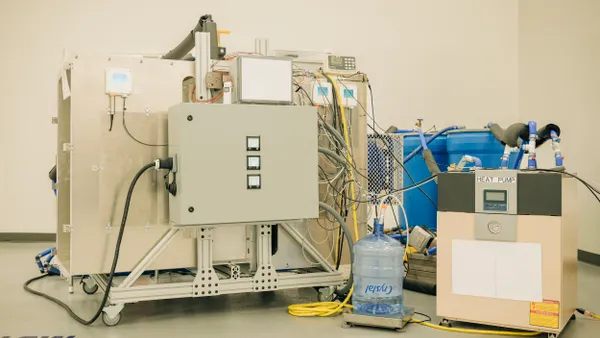Gas industry associations and a furnace manufacturer on Monday asked a federal appeals court to review a new energy efficiency rule they say “effectively bans the sale of non-condensing natural gas furnaces.”
The U.S. Department of Energy announced the new appliance efficiency standard for consumer furnaces in September and published it in the Federal Register on Monday, opening the window for groups to file legal challenges. The new standard is slated to go into effect in late 2028 and requires non-weatherized gas furnaces and those used in mobile homes to achieve an annual fuel utilization efficiency of 95%.
The American Gas Association, American Public Gas Association, National Propane Gas Association and manufacturer Thermo Products filed the lawsuit in the U.S. Court of Appeals for the District of Columbia Circuit. The groups say DOE data show that 30% of senior-only households, 26% of low-income households and 27% of small business consumers will face higher costs due to the new rules. For households with mobile home gas furnaces, 39% of consumers would see higher costs.
“AGA has attempted to work with the Department of Energy to address the rule’s profound impacts on consumers and homeowners with a solutions-oriented approach to energy conservation,” President and CEO Karen Harbert said in a statement. “Unfortunately, our 114 pages of comments have been summarily ignored.”
The National Propane Gas Association said it will seek to consolidate the lawsuit with others pending against DOE that also focus on whether the agency should have established a separate product class for non-condensing appliances in its energy efficiency rulemakings.
The new furnace standard will cut heating bills by about $50 annually for households that replace an old model with a new one, Andrew deLaski, executive director of the Appliance Standards Awareness Project, said in an email.
According to DOE, the new rule will save consumers almost $25 billion on energy bills over 30 years.
“The only parties that would benefit from keeping energy-wasting models on the market are gas utilities. Even so, several of the nation's largest gas utilities support the standard,” deLaski said.
The legal challenge to DOE’s new furnace rule is not surprising, said Mike Henchen, RMI principal for carbon-free buildings.
“There's clearly a big shift underway in this market, from equipment that produces more emissions to equipment that produces less,” he said. “I think we'll continue to see elements of the gas industry ... trying to hold on to the status quo for longer.”
In the United States last year, residential heat pump sales exceeded gas furnaces for the first time, making up 53% of heating system sales.
“This is a sustained trend that will continue,” Henchen said. “There is growing awareness of the value of electrification.”












